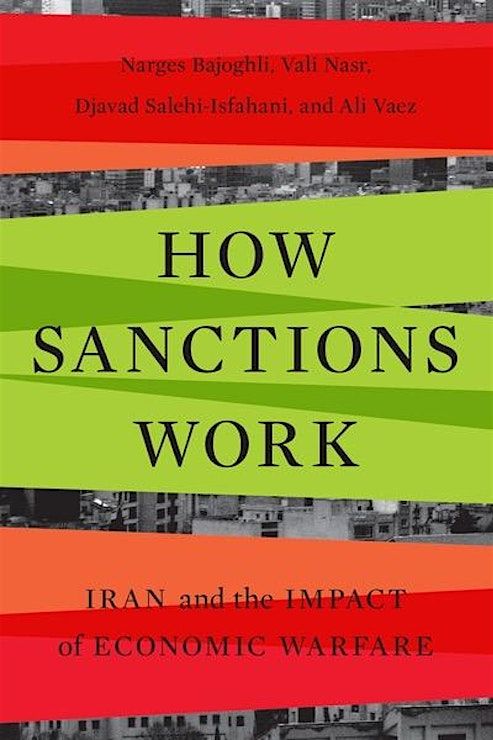
About this Event
Join us for this installment of our popular Chat & Chowder series, featuring Vali Nasr, Majid Khadduri Professor of Middle East Studies and International Affairs at the School of Advanced International Studies at Johns Hopkins University and Narges Bajoghli, Assistant Professor of Middle East Studies at the School of Advanced International Studies at Johns Hopkins University, to discuss their new book How Sanctions Work: Iran and the Impact of Economic Warfare.
Chat & Chowder programs are an excellent opportunity to engage with expert speakers and to network with other globally-oriented participants in an informal environment. Each event features a presentation, audience Q&A, dedicated time for networking, and (of course!) a selection of chowders and beverages.
Thanks to the generous support of The Lowell Institute, Chat & Chowder is now free of charge for all participants (Zoom live-streams remain free as well). We sincerely appreciate The Lowell Institute’s commitment to our mission, as well as the support of our venue, Foley & Lardner LLP.
Please consider helping sustain this work by making a contribution here.
This program will be streamed to Zoom from 6:15 to 7:15. To attend the program virtually, please register for the Zoom webinar here.
Advance registration is required. We cannot accommodate walk-ins for the in-person program.


Vali Nasr is the Majid Khadduri Professor of International Affairs and Middle East Studies at the Johns Hopkins University School of Advanced International Studies (SAIS) and a Non-Resident Senior Fellow at Atlantic Council’s South Asia Center. He served as the eighth Dean of Johns Hopkins SAIS between 2012 and 2019 and served as Senior Advisor to U.S. Special Representative for Afghanistan and Pakistan, Ambassador Richard Holbrooke between 2009 and 2011.
Professor Nasr is the author of multiple books; and numerous articles in scholarly journals. He has advised senior American policymakers, world leaders, and businesses, including the President, Secretary of State, senior members of the Congress, and presidential campaigns. He has written for The New York Times, Foreign Affairs, Financial Times, Wall Street Journal, and The Washington Post, among others.
Professor Nasr serves as the co-director of the SAIS Rethinking Iran Initiative at Johns Hopkins University, the leading hub for fostering a comprehensive and nuanced understanding of contemporary Iran and its regional influence within academia and the public sphere. He is a member of the International Board of Advisors of the Blavatnik School of Government at Oxford University, the International Board of Advisors at the American University of Beirut, the Board of Advisors of Rajaratnam School of International Studies in Singapore, and holds the 2024-25 Henry Alfred Kissinger Chair in Foreign Policy and International Relations at The John W. Kluge Center at the Library of Congress. He has been the recipient of grants from the John D. and Catherine T. MacArthur Foundation, the Harry Frank Guggenheim Foundation, and the Social Science Research Council, and was named a 2006 Carnegie Scholar.
He received his BA from Tufts University in International Relations summa cum laude and was initiated into Phi Beta Kappa in 1983. He earned his master's from the Fletcher School of Law in and Diplomacy in international economics and Middle East studies in 1984, and his PhD from MIT in political science in 1991.

Narges Bajoghli is Assistant Professor at the Johns Hopkins University, School of Advanced International Studies. She is an award-winning anthropologist, writer, and professor.
Trained as a political anthropologist, media anthropologist, and documentary filmmaker, Professor Bajoghli’s research is at the intersections of media, power, and resistance. She is the author of several books. With the support of the Johns Hopkins University Catalyst Award, Professor Bajoghli is currently writing her next manuscript on a global history of chemical warfare. In addition to her academic writing, Professor Bajoghli has written for such publications as The New York Times, The New York Times Magazine, Vanity Fair, Foreign Affairs, The Guardian, Foreign Policy, and Jacobin. She has appeared as a guest commentator on Iranian politics on CNN, DemocracyNow!, NPR, BBC WorldService, BBC NewsHour, and PBS NewsHour as well as in Spanish on radio programs across Latin America.
Professor Bajoghli received her PhD in socio-cultural anthropology from New York University, where her dissertation was awarded the Dean's Outstanding Dissertation Award in the Social Sciences. She was also trained as a documentary filmmaker in NYU's Culture and Media Program and at the NYU Tisch School of the Arts.
At Johns Hopkins University, Professor Bajoghli teaches classes on media, social movements, and counter-movements; contemporary Iranian politics and society; and ethnographic research methods to masters and PhD students. She is the recipient of the 2022 Excellence in Teaching Award at Johns Hopkins University, SAIS. Professor Bajoghli serves as the co-director of the SAIS Rethinking Iran Initiative.

Sanctions have enormous consequences. Especially when imposed by a country with the economic influence of the United States, sanctions induce clear shockwaves in both the economy and political culture of the targeted state, and in the everyday lives of citizens. But do economic sanctions induce the behavioral changes intended? Do sanctions work in the way they should?
To answer these questions, the authors of How Sanctions Work highlight Iran, the most sanctioned country in the world. Comprehensive sanctions are meant to induce uprisings or pressures to change the behavior of the ruling establishment, or to weaken its hold on power. But, after four decades, the case of Iran shows the opposite to be true: sanctions strengthened the Iranian state, impoverished its population, increased state repression, and escalated Iran's military posture toward the U.S. and its allies in the region. Instead of offering an 'alternative to war,' sanctions have become a cause of war. Consequently, How Sanctions Work reveals how necessary it is to understand how sanctions really work.

WorldBoston's Chat & Chowder series features key authors on international affairs in an engaging setting. In addition to discussion of a featured book (usually sold at a significant discount), the program offers the opportunity for discussion among members and guests - and of course a selection of chowders and beverages. This Chat & Chowder will be hosted in-person (from 6:00 to 7:30PM ET) and live-streamed to Zoom (from 6:15 to 7:15 PM ET only).
Event Venue & Nearby Stays
Foley & Lardner LLP, 111 Huntington Avenue, Boston, United States
USD 0.00










